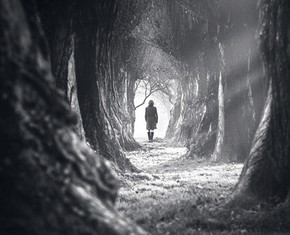The views expressed in our content reflect individual perspectives and do not represent the authoritative views of the Baha'i Faith.
Why, a college professor of mine once asked her class, do human beings have rituals, funerals, and ceremonies when people die? Why do we make the burial of the human body such a big deal?
The class seemed baffled at her question, until one anthropology student spoke up, answering with another question: “Well,” she said, “why do elephants and chimpanzees bury their dead?”
This exchange made the entire class think differently about death. If some of the higher mammals have the instinct or the emotion or the respect to bury their dead, then why wouldn’t humans?
RELATED: Death, Burial, and Human Nature
In fact, homo sapiens has practiced burial for a very long time, even before we emerged as modern humans. We have significant evidence of Neanderthal burials from more than a hundred thousand years ago, for example. Burial is one of the most widespread human customs, seen throughout every culture as far back as we can trace our history.
Those primitive cultures seemed to understand that our bodies come from mother Earth and return to it. They also clearly recognized the dignity of the human body, and realized that burying it was a sign of respect for its spirit. The great cycle of life and death, memorialized by that return to our origins, has made itself known to all people since the beginning of time.
In the same way, the Baha’i teachings say, our spirits return to their origins: “I came forth from God, and return unto Him, detached from all save Him, holding fast to His Name, the Merciful, the Compassionate.”
That single sentence, a quotation from the Baha’u’llah’s Most Holy Book, is inscribed on Baha’i burial rings. When a Baha’i passes away, one of those rings is placed on a finger before burial. It serves as a reminder to the living of the eventual destination of all our souls.
It also testifies to the faith of the wearer, and honors the physical form of that person, whose “… body, though now dust, was once exalted by the immortal soul of man!” The Guardian of the Baha’i Faith, Shoghi Effendi, wrote that phrase in a letter to a young Baha’i named Sally Sanor in 1944.
So how can we best preserve the dignity and nobility of each human body when it departs this earthly realm? The Baha’i teachings recommend a swift, simple burial, without embalming or other artificial preservatives; and a dignified but humble funeral service that includes prayer.
We all hope for a meaningful life – one capped by a meaningful death. The momentous passing of each person deserves recognition. As a thoughtful, spiritual society we need to encourage the acceptance of death as part of the natural cycle of life – one that brings beauty and significance to that second birth into the spiritual realm.
RELATED: The Environmental Case Against Cremation and Embalming
Maintaining that dignity, and commemorating the place of each individual in the circle of life, requires a solemn and sublime burial, not just a quick cremation, as Abdu’l-Baha pointed out:
If the disintegration [of the body] be rapid, this will cause an overlapping and a slackening in the chain of transferences, and this discontinuity will impair the universal relationships within the chain of created things.
For example, this elemental human body hath come forth from the mineral, the vegetable and the animal worlds, and after its death will be entirely changed into microscopic animal organisms; and according to the divine order and the driving forces of nature, these minute creatures will have an effect on the life of the universe, and will pass into other forms.
Now, if you consign this body to the flames, it will pass immediately into the mineral kingdom and will be kept back from its natural journey through the chain of all created things.
The elemental body, following death, and its release from its composite life, will be transformed into separate components and minuscule animals; and even though it will now be deprived of its composite life in human form, still the animal life is in it, and it is not entirely bereft of life. If, however, it be burned, it will turn into ashes and minerals, and once it has become mineral, it must inexorably journey onward to the vegetable kingdom, so that it may rise to the animal world. That is what is described as an overleap.
Cremation, and other similarly rapid “dispositions” of the deceased, interrupt the natural processes in our environment, Abdu’l-Baha said in a 1920 letter to the Baha’i singer and songwriter Shahnaz Waite:
The body of man, which has been formed gradually, must similarly be decomposed gradually. This is according to the real and natural order and Divine Law. If it had been better for it to be burned after death, in its very creation it would have been so planned that the body would automatically become ignited after death, be consumed and turned into ashes. But the divine order formulated by the heavenly ordinance is that after death this body shall be transferred from one stage to another different from the preceding one, so that according to the relations which exist in the world, it may gradually combine and mix with other elements, thus going through stages until it arrives in the vegetable kingdom, there turning into plants and flowers, developing into trees of the highest paradise, becoming perfumed and attaining the beauty of colour.
Cremation suppresses it speedily from attainment to these transformations, the elements becoming so quickly decomposed that transformation to these various stages is checked.
















Comments
Sign in or create an account
Continue with Googleor